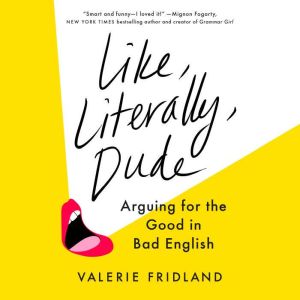

Like, Literally, Dude
Arguing for the Good in Bad English
Author: Valerie Fridland
Narrator: Valerie Fridland, Joniece Abbott-Pratt, Keylor Leigh, Andrew Eiden, Christopher Ryan Grant, Ellen Archer, Eileen Stevens, Nicky Endres
Unabridged: 8 hr 10 min
Format: Digital Audiobook Download
Publisher: Penguin Audio
Published: 04/18/2023
Categories: Nonfiction, Social Science, Popular Culture Studies, Language Arts, Linguistics
Synopsis
“Smart and funny—I loved it!" —Mignon Fogarty, author of New York Times bestseller Grammar Girl’s Quick and Dirty Tips for Better Writing
A lively linguistic exploration of the speech habits we love to hate—and why our “like”s and “literally”s actually make us better communicators
Paranoid about the “ums” and “uhs” that pepper your presentations? Concerned that people notice your vocal fry? Bewildered by “hella” or the meteoric rise of “so”? What if these features of our speech weren’t a sign of cultural and linguistic degeneration, but rather, some of the most dynamic and revolutionary tools at our disposal?
In Like, Literally, Dude, linguist Valerie Fridland shows how we can re-imagine these forms as exciting new linguistic frontiers rather than our culture’s impending demise. With delightful irreverence and expertise built over two decades of research, Fridland weaves together history, psychology, science, and laugh-out-loud anecdotes to explain why we speak the way we do today, and how that impacts what our kids may be saying tomorrow. She teaches us that language is both function and fashion, and that though we often blame the young, the female, and the uneducated for its downfall, we should actually thank them for their linguistic ingenuity.
By exploring the dark corners every English teacher has taught us to avoid, Like, Literally, Dude redeems our most pilloried linguistic quirks, arguing that they are fundamental to our social, professional, and romantic success—perhaps even more so than our clothing or our resumes. It explains how filled pauses benefit both speakers and listeners; how the use of “dude” can help people bond across social divides; why we’re always trying to make our intensifiers ever more intense; as well as many other language tics, habits, and developments.
Language change is natural, built into the language system itself, and we wouldn’t be who we are without it. Like, Literally, Dude celebrates the dynamic, ongoing, and empowering evolution of language, and it will speak to anyone who talks, or listens, inspiring them to communicate dynamically and effectively in their daily lives.


